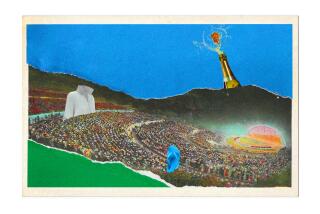MUSIC REVIEW : Doc Severinsen Tops a Night of the Brass at the Bowl
The appealing combination of former “Tonight Show” music director and jazz trumpeter Doc Severinsen and the Summit Brass ensemble drew 7,543 patrons, a modest but respectable number, to Hollywood Bowl on Wednesday.
The chance to hear Severinsen play Gershwin, as promised, however, in a suite commissioned for him and the group by Frank Montooth, failed to materialize. Someone had stolen the parts, Severinsen announced from the stage. A startling instance of musical larceny. Should we be suspicious?
So he and the 16-member group played Robert Haggart’s spirited “South Rampart Street Parade,” with conductor Carl Topilow also playing clarinet solo. It wasn’t exactly an even trade-off, but it did generate warm audience response.
The formidably accomplished Severinsen also stayed to be one of the four trumpet soloists in Thomas Stevens’ “A New Carnival of Venice,” a set of virtuoso variations on a sugary Italian folk tune. Stevens, principal trumpet for the Los Angeles Philharmonic, knows how to show off the instrument; he is not a member of the group, but seven of its 16 players belong to the Philharmonic.
Severinsen played with easy mastery and singing line, both here and earlier in the more straight, if academic, Five Episodes for Brass by Allen Vizzutti and Jeff Tysik.
Topilow opened the program with a crisp account of the Overture to Handel’s “Music for the Royal Fireworks,” with the musicians responding with stylish accuracy and balance.
Anthony Plog’s “Animal Ditties” proved a sometimes amusing suite of musical characterizations based on eight droll Odgen Nash poems, narrated pleasantly by horn player Thomas Bacon.
A Suite arranged from Leonard Bernstein’s “West Side Story” showed that not all arrangements for brass ensemble are congenial. Copland’s great “Fanfare for the Common Man” received respectful attention, as did John Cheetham’s skillful “Keystone Celebration,” commissioned by the group.
Pleasant discoveries were Civil War brass band pieces that evoked a gentler and simpler but by no means unengaging era of popular music.
More to Read
The biggest entertainment stories
Get our big stories about Hollywood, film, television, music, arts, culture and more right in your inbox as soon as they publish.
You may occasionally receive promotional content from the Los Angeles Times.










